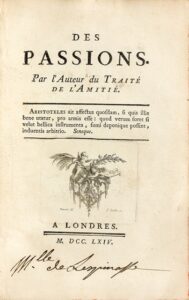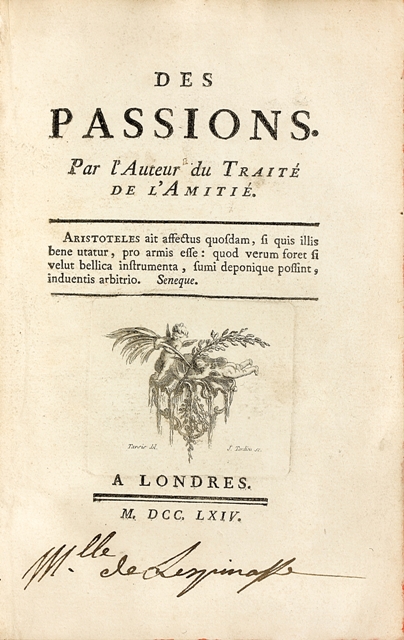Londres [Paris], 1764.
8vo [200 x 128 mm] of viii pp. including 1 engraved frontispiece, 221 pp., (1) p. of errata, 1 figure out of pagination and (1) l. of explanation of the engraving p. 117. Bound in full marbled calf, blind-stamped fillet on the covers, flat spine decorated with gilt fleurons, red morocco lettering piece, red edges. Contemporary binding.
First edition of this “moral work of a very witty person who knows how to think and nicely express what she thinks.” (F. X. Feller, Dictionnaire historique, p. 17.) Barbier, III, 803; Cohen, p.86; Cioranescu, III, 61728; Barbier, Examen critique et complément des dictionnaires historiques, I, p. 39-40.
“In her ‘Traité des Passions’, Madame Thiroux d’Arconville describes the pleasures of the bourgeois. The bourgeois is the only stable element in a perpetual changing world. In his sentimental life, the bourgeois ignores passion and any irrational behavior. He is preserved from the wrench of passions. Madame d’Arconville can’t conceive that the people have feelings.” (Mauzi, L’idée du bonheur dans la littérature et la pensée françaises au XVIIIe siècle.)
“Madame Thiroux d’Arconville (1720-1805) was really erudite, in sciences (chemistry, medicine, botanic…) as in history and literature; she knew Voltaire, gathered in her salons Turgot, Malesherbes, Lavoisier, Jussieu… and published anonymously a great number of works.” (Michaud)
“One of the most educated and modest women in the 18th century.” A fine and delicate tact, some spirit without affectation, instruction without pedantry, plenty of wise words, expressions full of imagery, a rare sense of the ‘à propos’ in quotes made her much more sought-after than she wished to. Her productions got, while she was still alive, many readers, by their only merit. ‘Des passions’ is a moral work of a very witty person who knows how to think and nicely express what she thinks.” (Barbier)
The illustration is composed of a fleuron and a tail-piece by Tarsis engraved by Tardieu and of two full page engravings unsigned.
A beautiful copy preserved in its contemporary marbled calf.
Madame de Lespinasse’s, private copy, with her handwritten ex libris on the title. Jeanne-Julie-Eléonore de Lespinasse(1732-1776), illegitimate daughter of the count Gaspard de Vichy and the countess d’Albon, is engaged as a reader in her aunt’s Parisian salon, Marie du Deffand. From 1747, this famous salon is frequented by D’Alembert, Fontenelle, Montesquieu, Marmontel, Marivaux… Julie’s quick-wittedness and delicacy soon seduced her aunt’s hosts. The fame of Julie de Lespinasse comes from the opening of her own salon in 1764, which will be frequented by Condillac, Marmontel, Condorcet and Turgot… Actually, she opened her own salon only after having broken up with the marquise du Deffand and taken with her most of the hosts of her former employer. The quarrel between the two women was tremendous. Her salon was said to be “the laboratory of the Encyclopédie”, which she was the muse. They were many to have fallen under the spell of this young woman with ardent and passionate spirit, but it is with D’Alembert that she created a real friendship.
Precious copy, particularly moving, associating two of the French women of letters who have marked the Enlightenment century, the author, Madame Thiroux d’Arconville, and the first owner of the book, letter writer and confidant of the Encyclopedists, Mademoiselle de Lespinasse.


